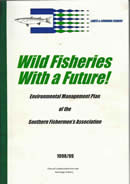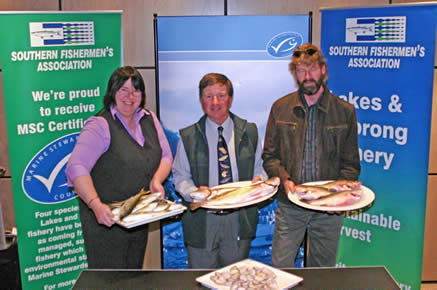Initiatives
Environmental Management Plan
Broadly speaking, society as a whole does not perceive the commercial fishing industry and its participants as environmentally responsible. In fact the quite the opposite, with many members of the public viewing the industry as a cause of significant damage and degradation to the aquatic environment. This is unfortunate because we believe that while such criticism may be justified for some fisheries around the world, it is certainly not the case for the Lakes and Coorong Fishery.
With a history going back almost one and a half centuries, we recognise that a healthy environment in the Lakes and Coorong region is crucial to our livelihood. We believe a healthy and environmentally sustainable ecosystem results in a healthy economically sustainable fishery. Consequently we endeavour to conduct our activities in a manner that minimises any adverse impact and where possible enhances the health of the ecosystem. As stakeholders with a permanent presence in the region we believe that we have a key role to play in the maintenance and enhancement of the environmental well being of the Lakes and Coorong.
On the other hand we make no claim to be perfect. While we would argue our aims and motives have never been in question, we acknowledge that our actions may have at times been lacking in their application. The manner in which we have addressed environmental issues in the past has tended to use a common sense approach, conducted on a informal and uncoordinated basis. Generally each individual fisher has been responsible for their own actions with only a few matters involving a more collective approach. While we believe that this has yielded a positive environmental outcome we seek further improvements, made possible through an integrated, cooperative approach. The adoption of this Environmental Management Plan is a major step toward achieving this.
The aim of the plan was to produce a formal, coordinated, industry wide response to the manner in which we conduct all of our activities with respect to interactions with the environment. This document represented the output of the first stage of the process in which we have conducted an initial review of our activities and identified various objectives, actions and targets for the year 1998/99. Stage two is currently under development.
This plan was not designed to be developed in isolation; in fact a key aspect of the plan is its cooperative approach. The plan itself is the result of a partnership venture between the Southern Fishermen’s Association and the Inland Waters Program of SARDI (Aquatic Sciences). Several other key stakeholder groups have or will be contacted in order to access their help and obtain their comments and input, to help maximise the benefits of the plan. By its nature the plan will never be finalised as it is designed to be adapted in response to change and the desire to consistently improve our environmental performance.
Our environmental management plan is important because it will help to achieve a healthier environment. In undertaking this plan the Southern Fishermen’s Association hopes to demonstrate to the community, the important and increasing role we play in maintaining and improving the health of the environment. In addition we hope to demonstrate to other industries that interact with the environment, in particular other fisheries, how they too can play a similar role.

The world's first environmental management plan for a fishery
Marine Stewardship Council Certification
In 1998, the SFA sought independent third party accreditation of the fishery’s operation under the Marine Stewardship Council (MSC) assessment framework. The MSC is an independent, global, non-profit organisation whose role is to recognise, via a certification program, well-managed fisheries and to harness consumer preference for seafood products bearing the MSC label of approval (MSC, 2002). Successful accreditation of the fishery under the MSC assessment framework can provide improved opportunities for commercial fishers to increase domestic and overseas market demand for species harvested from the fishery. See fact sheet 10
“The Southern Fishermen’s Association believes that MSC certification, coupled with independent science, aggressive environmental partnerships with local conservation groups and active communication of our role as environmental watchdogs to our local community will guarantee our future. If like most fishermen, we just keep fishing and don’t work for the future, we won’t have a future.”
From "SFA and WWF—Partnership” Brochure
